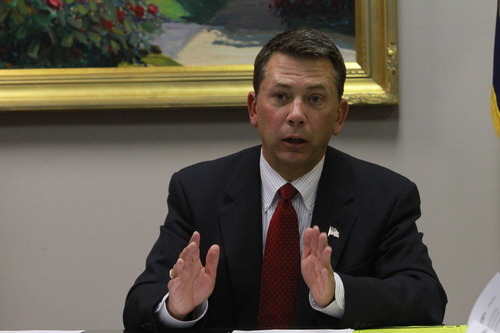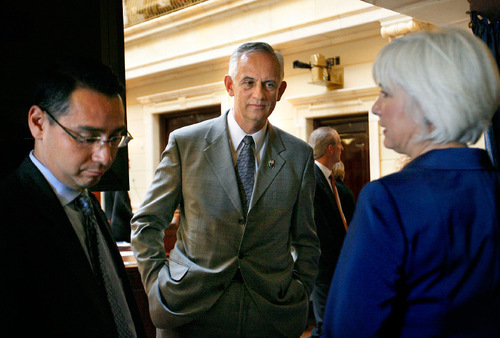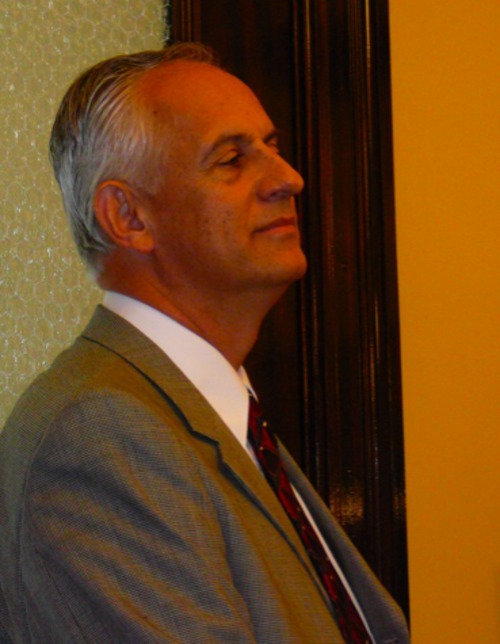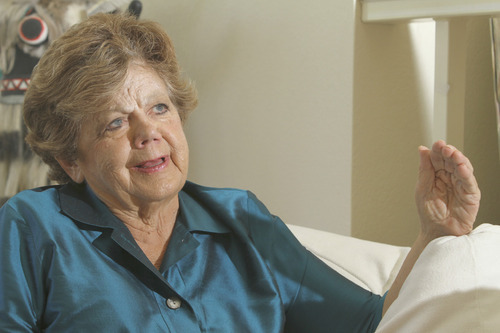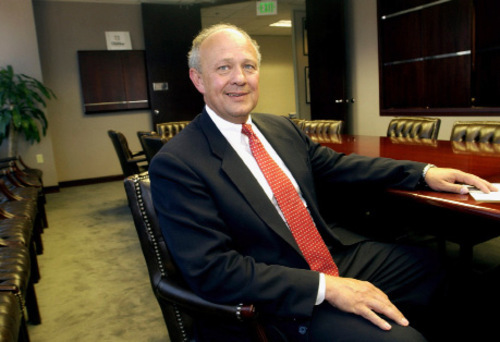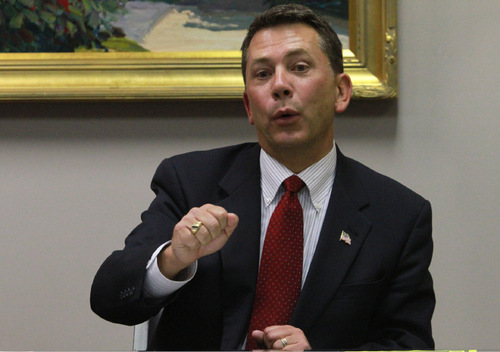This is an archived article that was published on sltrib.com in 2010, and information in the article may be outdated. It is provided only for personal research purposes and may not be reprinted.
Rep. Stephen Sandstrom said the LDS Church's position on immigration announced Thursday was directed squarely at his enforcement-only bill and suggested the church should leave the issue to lawmakers.
"I kind of wish I'd been given more of a heads-up because it is taking aim at the bill I'm doing," Sandstrom lamented Thursday. "My other thought was that I thought the church's no-position was the best way to go and to let this be the purview of government."
The LDS position came on the heels of a broad coalition of religious and political leaders signing the Utah Compact at a public ceremony at the State Capitol. The compact was set up as an immigration policy document designed to reduce angry rhetoric and emphasize empathy and economic contributions made by undocumented workers within the state.
The compact declares immigration a federal issue, not one that should be handled by Utah. It also says scarce law enforcement resources should focus on crime, not on civil violations, such as illegal immigration.
Though not an official signer of the policy statement, the LDS Church threw its support behind the compact and said it is "consistent with important principles" within the faith. Up until this point, the church been more reticent to jump forcefully into the hot-button issue.
"We recognize an ever-present need to strengthen families," the statement read in part. "Families are meant to be together. Forced separation of working parents from their children weakens families and damages society."
Tony Yapias, director of Proyecto Latino de Utah, said it's a statement that goes a long way toward what the community has been looking for. Latino leaders, including Yapias, are planning a formal public statement Friday at Centro Civico Mexicano.
"This is the strongest statement that I've heard so far," Yapias said. "This is very good."
The Utah Compact drew heavy hitters from other quadrants of the state as well, including outspoken Attorney General Mark Shurtleff and the bishop of the Salt Lake City Catholic Diocese, John Wester.
Wester's comments echoed the key principle in the LDS statement.
"We oppose policies that unnecessarily separate families," he said. "We champion policies that support families and improve the health, education and well-being of all Utah children."
Sandstrom, who has been working on his bill since April, didn't believe the bill's prospects dimmed in light of Thursday's developments and said that even if the church issued an ultimatum to kill his legislation, he'd press ahead.
He also had a warning for the church.
"I think this is going to open up a huge division," Sandstrom said, pointing out he'd already been "bombarded with emails" from people "telling me to not back down."
The issue of immigration has been a prickly topic within the LDS Church as well as on the political landscape — set off earlier this year when Arizona signed its enforcement-only bill into law. That bill, authored by State Sen. Russell Pearce — who is Mormon — became a flash point for the debate and put Sandstrom's bill in the national limelight.
Sandstrom has spent the past several months meeting with various groups on both sides of the issue trying to make adjustments to his bill to insulate it from legal challenges. He has said the current version of his bill is less harsh than Arizona's and that he will unveil a final version of it in the next few weeks.
The Orem Republican said he plans to push forward with his bill, which requires local law officers to enforce federal immigration laws, despite the church's more pointed statement.
"I don't see where my bill should be deterred in any way," Sandstrom said.
Senate President Michael Waddoups, R-Taylorsville, said he expected it to be "hotly debated" in January when the legislative session starts. He wouldn't wade into the handicapping of whether the bill was crippled by the Utah Compact and the LDS Church's support of it.
Waddoups also expected to see several immigration bills come before the Legislature and that an Arizona-style bill wouldn't be the only thing considered during the session.
More than 80 percent of Utah lawmakers are members of the LDS Church, compared with slightly more than 60 percent of the general Utah population.
Quin Monson, associate director of the Center of the Study of Elections and Democracy at Brigham Young University, said these moments can crystallize the debate.
"The more specific and direct the church is on questions like this, the more likely it is to affect public opinion," Monson said. "And this is more specific and direct than they have been in the past. It still leaves some room for interpretation, but by broadly supporting the Utah Compact, I think it has real potential to shape the debate. And, as we know, elected officials are sensitive to public opinion."
The guiding principles of the Utah Compact center around federal solutions, law enforcement, families, the economy and a free society.
Gov. Gary Herbert issued a statement saying he is "heartened that business, community and ecclesiastical leaders have come together to lend their voices to this effort."
The public ceremony in the plaza at the Capitol included former Govs. Olene Walker and Norm Bangerter, Salt Lake Chamber President Lane Beattie and Paul Mero, president of the Sutherland Institute.
Beattie tackled the economic portion of the compact.
"We acknowledge the economic role immigrants play as workers and taxpayers, both today and in our history," Beattie said. "Utah's immigration policies must reaffirm our global reputation as a welcoming and business-friendly state."
Sandstrom said he has been hamstrung by the single-subject rule of writing bills and that is why his is enforcement only. He said he is currently working on another bill that addresses the economics of illegal immigration.
dmontero@sltrib.com • You can access the Utah Compact at the website: http://www.utahcompact.com
• To see the text of the LDS Church statement, go to http://bit.ly/deTQ3b The Utah Compact
—
This statement of principles contains five points:
• Immigration is a federal — not state — policy issue
• Limited police resources should be focused on crime, not civil violations
• Policies that unnecessarily separate families should be opposed
• Utah policies should reaffirm the state as a welcoming, business-friendly place
• Utah should adopt a humane approach Compact signers
—
A sampling of the list supporters:
Bishop John C. Wester, of the Salt Lake City Catholic Diocese
Former Gov. Norm Bangerter
Former Gov. Olene Walker
Utah Attorney General Mark Shurtleff
Pamela Atkinson, community activist
Salt Lake Chamber of Commerce President Lane Beattie
Salt Lake County Mayor Peter Corroon
Salt Lake City Mayor Ralph Becker
Former U.S. Sen. Jake Garn
Rep. Sheryl Allen
Deseret Management CEO Mark Willes
Medianews CEO Dean Singleton
Michael Clara, Republican Hispanic Assembly president
Episcopal Bishop Scott Hayashi
Former Congressman Jim Hansen
Salt Lake County Council Chairman Joe Hatch
Salt Lake City Councilman J.T. Martin
State Sen. Pat Jones
Paul Mero, Sutherland Institute president
Ogden Mayor Matthew Godfrey
Questar CEO Ron Jibson
Ivory Homes CEO Clark Ivory
Jill Taylor, president of KeyBank's Utah district


